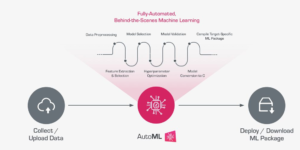

(Dmitriy Rybin/Shutterstock)
Many companies are scrambling to find machine learning engineers who can build smart applications that run on edge devices, like mobile phones. One company that’s attacking the problem in a broad way is Qeexo, which sells an AutoML platform for building and deploying ML applications to microcontrollers without writing a line of code.
Qeexo emerged from Carnegie Mellon University in 2012, just at the dawn of the big data age. According to Sang Won Lee, the company’s co-founder and CEO, the original plan called for Qeexo to be a machine learning application company.
The company landed a big fish, the Chinese mobile phone manufacturer Huawei, right out the gate. Huawei liked the ML-based finger-gesture application that Qeexo (pronounced “Key-tzo”) developed, and the company wanted Qeexo to ensure that it could run across all of its phone lines. That was a good news-bad news situation, Lee says.
“Our first commercial implementation with Huawei kept the whole company in China for two months, to finish one model with one hardware variant,” Lee tells Datanami. “We came back and it was difficult to keep the morale high for our ML engineers because nobody wanted to constantly go abroad to do this type of repetitive implementation.”
It quickly dawned on Lee that, with more ML models and more hardware types, the amount of manual work would quickly get out of hand. That led him to the idea of developing an automated machine learning, or AutoML, platform that could automatically generate ML models based on the data presented to it, automatically “flash” it to a group of pre-selected microcontrollers.
Lee and his team of developers, which is led by CTO and co-founder Chris Harrison (who is an assistant professor at Carnegie Mellon University), developed the offering nearly five years ago, and the company has been using it ever since for its own ML services engagements.
Huawei continues to utilize Qeexo’s AutoML solution to generate ML applications for its handsets. “In 2018, we completed 57 projects for Hauwei, and most of the projects were completed by our field engineers just using the AutoML platform, without the help of ML engineers in the US,” Lee says.
In October 2019, Qeexo released its AutoML offering as a stand-alone software offering. The product automates many steps in the ML process, from building models from collected data, comparing performance of those models, and then deploying the finished model to a microcontroller – all without requiring the user to write any code.
The offering has built-in support for the most popular ML algorithms, including random forest, gradient boosted machine, and linear regression, among others. Users can also select deep learning models, like convolutional neural networks, but many microcontrollers lack the memory to handle those libraries, Lee says.
Qeexo’s AutoML solution automatically handles many of the engineering tasks that would otherwise require the skills of a highly trained ML engineer, including feature selection and hyperparameter optimization. These feature are built into the Qeexo offering, which also sports a built-in C compiler and generates binary code that can be deployed to microcontrollers, such as those from Renasas Electronics.
Lee says ML engineers might be able to get a little more efficiency by developing their own ML libraries, but that it won’t be worth the effort for many users. “There are always more improvements that you can get with ML experts digging into it and doing the research,” he says. “But this is giving you the convenience of being able to build a commercially viable solution without having to write a single line of code.”
Today Qeexo announced its new AWS solution. Instead of training a model on a laptop, customers can use now AWS resources to train their model. It also announced more ML algorithms, including deep learning algorithms and “traditional” algorithms. The visualization that Qeexo provides have also been enhanced to give the user the ability to better spot outliers and trends in data. Support for microphone data has been supported. And it also added support for the Renesas RA Family of Cortex-M MCUs, which are geared toward low-power IoT edge devices.
Having Huawei as a client certainly gives Qeexo some experience with scalability under its belt. But the Mountain View, California-based company is bullish on the potential for a new class of application developers to get started using its software to imbue everyday devices with the intelligence of data.
“What we really want to tell the market is that even or those microcontrollers that are already out and that have very limited memory resource and processing power, you can still have a commercially viable ML solution running on it, if you use the right tool,” Lee says. “You don’t want to neglect all the sensor data that’s connected to the microcontroller. We can provide a tool that you can use to build intelligence that can be embedded into those tools.”
Related Items:
On the Radar: Cortex Labs, RadicalBit, Qeexo
AutoML Tools Emerge as Data Science Difference Makers
Cloud Tools Rev Up AI Dev Platforms
September 19, 2025
- Cisco and Qumulo Partner to Bridge the Data Gap from Edge to Core to Cloud
- Adastra Achieves Elite Partner with Databricks to Accelerate AI-Driven Innovation
- Digital.ai Strengthens Key and Data Protection with White-box Cryptography Agent
- Datalinx AI Builds Leadership Team to Transform Messy Data Into Actionable Intelligence
- Huawei Cloud Showcases Global Infrastructure, Data, and AI Engines at HUAWEI CONNECT 2025
- ScaleOut Software Delivers Next-Gen Caching with Version 6
- Argonne: Turning Materials Data into AI-Powered Lab Assistants
- EY Announces Alliance with Boomi to Offer Broad Integrated Solutions and AI-Powered Transformation
- Rice University Accelerates AI Innovation to Transform Teaching, Learning and Research
- Tigera Launches Solution to Protect AI Workloads Running on Kubernetes
September 18, 2025
- EDB Research Shows 87% of Enterprises Lag in Sovereign AI Adoption
- Zencoder Brings AI Coding to a Billion Users with Universal AI Development Platform
- PingCAP Brings Global Data Leaders Together for TiDB SCaiLE 2025 in California
- Qlik Connect 2026 Set for April 13–15 in Florida
- Domo Selected by Showpass to Deliver Scalable, Real-Time Embedded Analytics Worldwide
- Databricks Launches AI Accelerator Program to Scale the Next Generation of AI Startups
- Kennesaw State Researchers Tackling AI-Generated Fraud to Protect Data Integrity
- Salesforce Deepens Commitment to UK AI Innovation, Increases Investment to $6B
September 17, 2025
- Inside Sibyl, Google’s Massively Parallel Machine Learning Platform
- What Are Reasoning Models and Why You Should Care
- Rethinking Risk: The Role of Selective Retrieval in Data Lake Strategies
- In Order to Scale AI with Confidence, Enterprise CTOs Must Unlock the Value of Unstructured Data
- The AI Beatings Will Continue Until Data Improves
- Beyond Words: Battle for Semantic Layer Supremacy Heats Up
- Software-Defined Storage: Your Hidden Superpower for AI, Data Modernization Success
- How to Make Data Work for What’s Next
- What Is MosaicML, and Why Is Databricks Buying It For $1.3B?
- Top-Down or Bottom-Up Data Model Design: Which is Best?
- More Features…
- Mathematica Helps Crack Zodiac Killer’s Code
- GigaOm Rates the Object Stores
- Solidigm Celebrates World’s Largest SSD with ‘122 Day’
- Promethium Wants to Make Self Service Data Work at AI Scale
- AI Hype Cycle: Gartner Charts the Rise of Agents, ModelOps, Synthetic Data, and AI Engineering
- MIT Report Flags 95% GenAI Failure Rate, But Critics Say It Oversimplifies
- Data Prep Still Dominates Data Scientists’ Time, Survey Finds
- The Top Five Data Labeling Firms According to Everest Group
- Career Notes for August 2025
- Sphinx Emerges with Copilot for Data Science
- More News In Brief…
- Seagate Unveils IronWolf Pro 24TB Hard Drive for SMBs and Enterprises
- Gartner Predicts 40% of Generative AI Solutions Will Be Multimodal By 2027
- DataSnap Expands with AI-Enabled Embedded Analytics to Accelerate Growth for Modern Businesses
- Acceldata Announces General Availability of Agentic Data Management
- Qlik Announces Canada Cloud Region to Empower Data Sovereignty and AI Innovation
- Transcend Expands ‘Do Not Train’ and Deep Deletion to Power Responsible AI at Scale for B2B AI Companies
- Pecan AI Brings Explainable AI Forecasting Directly to Business Teams
- Databricks Surpasses $4B Revenue Run-Rate, Exceeding $1B AI Revenue Run-Rate
- SETI Institute Awards Davie Postdoctoral Fellowship for AI/ML-Driven Exoplanet Discovery
- Deloitte Survey Finds AI Use and Tech Investments Top Priorities for Private Companies in 2024
- More This Just In…








































